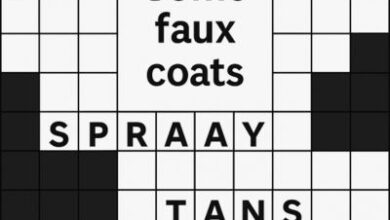Head Outside Crossword: Unpacking the Clue and Its Clever Meaning

Crossword puzzles are an enduring favorite among lovers of language, logic, and wit. Each clue in a crossword is a small challenge—part riddle, part definition, part joke. One such clue that has both amused and puzzled solvers is “Head outside?” (or simply head outside crossword).
At first glance, this clue looks deceptively simple: two words and a question mark. But in crossword-speak, that simplicity is usually a signal of something sneaky. What seems literal may actually hide a pun or a historical reference. Let’s explore how this clue works, why it’s so effective, and how it teaches us about the playful side of language.
1. Why “Head Outside?” Catches Solvers’ Attention
Crossword solvers learn quickly to watch out for question marks. When a clue ends with one, it often signals wordplay—a pun, double meaning, or figurative twist.
With “Head outside?”, the first instinct might be to read it literally: perhaps it means “go outside,” as in head outdoors. But the clue’s question mark tells us something else is going on. The setter (crossword constructor) wants us to think again about what head might mean and how outside might be used.
Good clues work because they hide the real definition in plain sight. Here, “head” isn’t about anatomy—it’s a sly nod to an older meaning of the word.
2. The Hidden Meaning: “Head” as a Toilet
In nautical tradition, “head” refers to the toilet on a ship. The term dates back hundreds of years. On early sailing vessels, the toilet area was positioned at the head, or bow, of the ship. That location allowed the ocean waves to wash away waste naturally.
Over time, “head” became standard naval slang for a lavatory. Sailors and later civilians continued to use it, especially in American English.
So in crosswords, “head” doesn’t only mean leader or top—it can also mean toilet. That double meaning opens the door (or should we say, the outhouse door?) for some clever wordplay.
3. Solving the Clue Step by Step
Let’s solve “Head outside?” together.
- Step 1: Notice the question mark — wordplay ahead.
- Step 2: Reconsider “head.” In crossword language, it could mean loo, toilet, latrine, privy, or WC.
- Step 3: Look at “outside.” Could it refer to outdoors, or to something external?
- Step 4: Combine the two meanings: a head (toilet) that is outside = PRIVY.
The word privy literally means an outdoor toilet or outhouse—a perfect fit.
Thus, the clue works as a concise and witty definition:
Head outside? → PRIVY
It’s one of those moments solvers love: short clue, layered meaning, perfect click of logic.
4. Variations and Alternate Answers
Crossword constructors often experiment with plural or reworded versions of good clues.
- “Heads outside?” — a plural form that could lead to PORTA-POTTIES.
- “Head outside maybe?” — a rephrased version pointing again to PRIVY or OUTHOUSE.
The trick remains the same. “Head” = toilet, “outside” = outdoors. By pluralizing or adding slight wording shifts, constructors create fresh challenges while preserving the joke.
5. Why This Clue Works So Brilliantly
Clues like “Head outside?” succeed for several reasons:
- Economy of words: Two words create a full riddle.
- Surprise factor: Solvers expect an action (“go outside”) but get a noun (an outdoor toilet).
- Humor: The mental image is funny once you get it.
- Fairness: Even if tricky, the answer makes total sense once explained.
- Cultural history: It teaches a bit of naval slang along the way.
Crossword constructors often aim for exactly this combination of cleverness, learning, and humor.
6. A Short History of the Word “Privy”
The word privy comes from Middle English and Old French roots meaning “private.” In earlier centuries, homes often had a small structure outdoors for private bodily functions—thus the term privy.
By the 17th and 18th centuries, the word was standard for toilet, outhouse, or latrine. Even today, historical homes and museums may describe an outdoor toilet as “the privy.”
So when modern solvers connect “head outside?” to privy, they’re touching a linguistic lineage stretching back centuries.
7. Understanding the “?” in the Clue
The punctuation in a crossword clue is rarely decorative. The question mark is a wink from the constructor—it says, “This clue isn’t literal.”
Here, without the “?”, “Head outside” would just sound like a direction. The question mark adds a tone of irony or mischief. It invites solvers to look for the figurative sense, not the physical action.
This little mark is one of the most important tools in crossword construction, allowing subtle humor and playfulness without outright telling the solver it’s a joke.
8. The Role of Context and Answer Length
In crosswords, the same clue can yield different answers depending on context.
If the grid specifies:
- 5 letters → PRIVY fits.
- 8 letters → OUTHOUSE might fit.
- 12 letters (plural) → PORTA POTTIES fits.
The answer length, along with crossing letters from other clues, helps the solver decide. The clue’s wording stays consistent, but the grid determines which version works best.
9. Lessons for Crossword Solvers
Clues like “Head outside?” teach valuable solving habits:
- Look for alternative meanings. Every common word—like “head”—might hide a slang or specialist sense.
- Watch for question marks. They nearly always indicate humor, puns, or metaphors.
- Use crossing letters wisely. They narrow the field of plausible answers.
- Remember brevity equals trickiness. The shorter the clue, the more likely it hides a double meaning.
By mastering such clues, solvers improve not only at puzzles but also at flexible thinking and vocabulary recall.
10. The Broader Appeal of Toilet-Humor Clues
Bathroom-related clues may sound silly, but they’re surprisingly popular. Constructors use them sparingly and cleverly, often for comic relief in otherwise tough puzzles.
Classic examples include:
- “Place to go?” → LOO
- “Head outside?” → PRIVY
- “Heads outside?” → PORTA POTTIES
They work because they toe the line between funny and respectable. They’re cheeky but never crude—more a linguistic wink than a bathroom joke.
11. Why Crossword Creators Love Dual-Meaning Clues
For constructors, “Head outside?” represents near-perfect craftsmanship:
- It’s short, fitting neatly into limited grid space.
- It allows a natural-sounding surface reading.
- It hides a second layer of meaning that makes sense once revealed.
Constructors are constantly balancing challenge and fairness. A clue like this feels fair because once you know the answer, the logic is airtight. There’s no arbitrary trickery—just clever re-interpretation.
12. The Joy of the “Aha!” Moment
Every crossword solver knows the rush when a difficult clue finally makes sense. In psychology, this is known as the Eureka effect—that pleasurable flash of insight when a problem suddenly resolves.
“Head outside?” delivers that perfectly. At first it seems vague or nonsensical. Then realization hits: head = toilet, outside = outdoors → PRIVY. The answer feels earned, not guessed. That satisfaction keeps solvers coming back.
13. Cultural and Linguistic Takeaways
Beyond the puzzle itself, this clue offers interesting cultural insights:
- It shows how language evolves. “Head” changed from an anatomical term to a piece of sailors’ slang.
- It reveals how crosswords preserve old vocabulary. Many people encounter words like privy only in puzzles.
- It demonstrates universal humor. Wordplay about human needs is timeless and relatable.
- It reflects social change. Once-common outdoor toilets are now historical curiosities, yet they live on in crossword grids.
Crosswords often serve as mini-time capsules, preserving forgotten words and cultural quirks for future generations.
14. How Writers Can Use This Clue Type
If you’re a language or puzzle blogger, the “Head outside?” clue provides a great example of how to turn crossword analysis into engaging content. You can:
- Explain the history behind the words.
- Show how puzzle logic works step-by-step.
- Compare similar clues across puzzles.
- Reflect on why humor and surprise make good writing tools.
This structure works well for educational, entertainment, or SEO-friendly articles alike.
15. Common Pitfalls in Interpreting It
Even experienced solvers sometimes misread clues like “Head outside?”. Common mistakes include:
- Taking it literally. Thinking it means “go outside” instead of looking for a noun.
- Forgetting slang. Not recalling that “head” = toilet in naval jargon.
- Ignoring punctuation. Overlooking the question mark, which signals a pun.
- Guessing too fast. Jumping to answers like “LEADER” or “BOSS,” which don’t fit the “outside” twist.
The best approach is patience: read, reinterpret, and look for that secondary meaning.
16. Broader Puzzle-Making Lessons
From a constructor’s standpoint, this clue illustrates key principles of great puzzle design:
- Precision: Every word must serve a purpose.
- Fairness: Once solved, the clue must feel logical.
- Brevity: Less is more.
- Charm: The solver should smile at the answer.
“Head outside?” checks all four boxes. It’s a micro-lesson in how minimal wording can still pack a big payoff.
17. How “Head Outside Crossword” Became a Search Trend
Many crossword fans search online for clues they can’t quite solve. “Head outside crossword” has become a recurring search term because it’s short, tricky, and memorable.
These searches lead solvers to answer databases and discussion blogs where communities share interpretations. The clue’s popularity highlights how the internet has turned crossword solving into a collective experience rather than a solitary one.
18. The Language of Play
Wordplay sits at the heart of human communication. Clues like “Head outside?” show that even mundane words can carry humor, history, and intelligence.
They also remind us that puzzles aren’t just pastimes—they’re exercises in creative thinking. Each clue trains the brain to hold multiple meanings in mind at once, to question assumptions, and to enjoy ambiguity.
That’s why crossword culture continues to thrive both in print and online. It’s not just about filling boxes; it’s about celebrating the playful potential of language.
19. Conclusion: The Art of Saying Much with Little
The clue “Head outside?” is a masterclass in linguistic economy. In two words, it conjures a centuries-old nautical term, an architectural image, and a laugh. It’s fair, funny, and memorable—the trifecta of crossword success.
For solvers, it’s a moment of discovery. For constructors, it’s a model of craft. For language lovers, it’s proof that humor and intellect coexist beautifully.
And for readers of Newsta, it’s a reminder of why words matter—how they twist, evolve, and keep us endlessly entertained
Q1. What does “Head outside crossword” mean?
It’s a crossword clue that plays on the nautical meaning of “head” as a toilet. The clue points to an outdoor toilet — usually answered as PRIVY.
Q2. Why is there a question mark in the clue?
The “?” signals that the clue involves a pun or nonliteral meaning — it’s a playful hint that solvers must think beyond the surface.
Q3. What is the most common answer to “Head outside?”
The most frequent answer in major puzzles is PRIVY, meaning an outdoor toilet or outhouse.
Q4. Has the clue appeared in major crosswords?
Yes, versions of it have appeared in puzzles like The Los Angeles Times and The New York Times, sometimes as “Head outside?” or “Heads outside?”.
Q5. Why do solvers enjoy this clue?
Because it’s short, witty, and delivers that satisfying “aha!” moment when the double meaning clicks.



